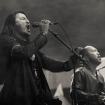The camera whirs around massive mountains and deep-green forests as four Mongolian men churn out crushing riffs on gleaming, non-rock instruments: the morin khuur, a horsehead fiddle; and the tovshuur, a two-stringed lute. The frontman lets out a cavernous bellow that borders on a death-metal growl — but listen closer and you'll notice the guttural tones are balanced out by whistle-like harmonics, an element of traditional throat singing.
These epic, dramatic scenes make up the video for "Yuve Yuve Yu" ("What's Going On?"), lead single from the HU's debut album, The Gereg. And it's one of the most unlikely YouTube viral hits in recent memory, having racked up well over 19 million views since its premiere in September 2018.
Singer and morin khuur player TS. "Gala" Galbadrakh isn't positive why the cross-cultural clip — and follow-up video "Wolf Totem," which itself has generated over 13 million hits and reached No. 1 on Billboard's Hard Rock Digital chart — touched a nerve on such a massive international scale. But he's confident that the band's "mixture of Eastern and Western, old and new" is resonating with adventurous rock fans.
"Of course, it also has a lot to do with our visuals," he says through their translator. "Our clothing is not exactly old Mongolian — it's still there, but we're making it rock-looking. And in order to do the 'Yuve Yuve Yu' video, we traveled [6,000 miles] off-road for so many days because we wanted to show the world how beautiful Mongolia is, how beautiful the nature is. Because of our hard work, people see that."
The Gereg will be released this fall via Eleven Seven Music (home to Mötley Crüe, In Flames and Hellyeah), and the quartet admire the work of popular rock and metal acts like Tool, Slipknot, Lamb of God, System of a Down and Korn. But Gala draws a line in the sand between the HU and other heavy bands. "We play 'hunnu rock,'" he clarifies, using their term derived from "hu," the Mongolian root word for "human being." "It's not exactly all metal or all hard rock or punk rock. It's a combination of many things combined with Mongolian music."
The band members — Gala, B. "Enkush" Enkhsaikhan (morin khuur, throat singing), G. "Jaya" Nyamjantsan (jaw harp, throat singing, flute, the Mongolian flute tsuur) and N. "Temka" Temuulen (tovshuur) — have known and collaborated with each other for years. But the HU is their first project to fully fuse rock and traditional Mongolian sounds: arena-sized bass guitar and drums with tranquil flute passages and meditative string drones.
They have a deep connection to their country's traditional sounds. All four members studied music at the Mongolian State Conservatory (where Jaya still teaches). Gala began his training at age 11 — first at music school, then the conservatory, then by earning a master's degree in the subject.
But the HU wouldn't exist without a lightbulb moment from their producer, B. "Dashka" Dashdondog, who started experimenting with the musical concept around 2011. "He got this idea, and he started researching old Mongolian poetry and music and instruments," Gala says. "We knew him before we started this project. Temka has worked at Dashka's studio for eight years. Temka and I studied in music school together for 10 years since [age 12]. Enkush and Jaya and I played in another band about 10 years. We're all friends, and we were working on different projects. When Dashka came up with this idea, we all knew who we should play with. We started working together in 2016, and we found the sound we were looking for."

"In the past … we had this idea that we should build something like this," adds Enkush. "Gala and I used to talk about doing a rock project, but we'd never done anything like this before. When we met Dashka, we knew exactly what to do."
Working with Dashka, the HU wound up with nine cinematic songs that seamlessly meld their influences, often highlighting the areas where the two overlap. "Wolf Totem" combines a bluesy hard-rock riff with the morin khuur's elegant drone into one walloping wall of sound. "The Great Chinggis Khaan" — named after the famous Mongolian leader better known in the West as Genghis Khan — opens with a dusty riff that could be piped in from an old Robert Johnson recording before exploding into a marching pattern based on an old Mongolian rhythm.
"We wanted to show the world who Chinggis Khaan really was," Gala says of the latter. "Our ancestors and Khaan brought a lot of beautiful things into the world: the first postal service; the Gereg, which is the first diplomatic passport introduced to the world. In the song, we talk about that. In my country, he is considered the founding father, just like George Washington is in America."
Despite The Gereg's intensity, much of the album's lyrics tap into a sense of reverence — like on the airy and uplifting "The Legend of Mother Swan," which showcases the harmonic range of the band's throat singing. "The message of the song is about the love of mothers for the kids," Gala notes of the track. "It talks about how a mother can sacrifice her own life until the end for her kids. And the melody is actually inspired by old Mongolian praises. It has the power to reach people's hearts. It's from the heart to the heart."
Given the global platform they earned via YouTube, the HU have an entire nation rooting for them with The Gereg. And the band members have recently become literal cultural diplomats: In April 2019, the country's Minister of Foreign Affairs bestowed them with the collective title of "Official Mongolian Ambassador to the World," and they even met with the country's president, Khaltmaagiin Battulga, the following month.
And so, like Khan before them, they're expanding their empire — they've just completed a run of summer festivals in the U.K. and Europe and will be touching down in North America this fall. "We're so humbled by the reaction," Gala says. "All of our headlining shows are sold out, and everywhere we go it's full of people chanting 'HU! HU!'"
The HU are taking advantage of their unexpected flurry of fame, with plans to complete tracking their as-yet-untitled sophomore album (which is currently half-finished) when they return to Mongolia. (As before, they're working with Dashka, whom they consider part of the group itself: "Of course he's working with us," Gala says. "He's more than just a producer for us — he's almost like a band member. We're a big family.")
Even with so many eyes on them, they don't feel the pressure. "We are calm," Jaya says. "We're super excited. Our years of working and schooling and crafting our skills have gotten us here, and we're going to go so much further."
It's fitting that they feel centered. Despite its heaviness, their music ultimately leaves behind a sense of meditative calm — which, as Gala notes, was their intention from the beginning.
"We were hoping to [have that effect] when we were making the songs," he says. "This [traditional] music has been here thousands of years. In our culture, we believe that when we play morin khuur in a Mongolian house, it brings good spirits to the home, cleanses and purifies it. Through our music, we hope to inspire people with strength and bring out the positive in every person to become a warrior."








